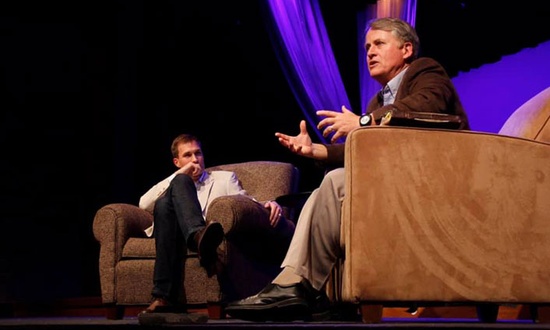Ever heard of a “gospel patron”? Most probably haven’t, yet it’s a revolutionary concept that has the potential to encourage God’s people to pursue greater, eternity-impacting generosity.
John Rinehart is the author of a book I highly recommend: Gospel Patrons: People Whose Generosity Changed the World. In his article “We Need Gospel Patrons,” John writes,
The word patron occurs only once in the Bible, in Romans 16:2. It’s a reference to Phoebe, the apostle Paul’s patron. But throughout Scripture there are many examples of gospel patrons, although they are generally found in the verses we read right over on our way to the “good stuff.”
For example, how did Jesus and his disciples fund their three years of preaching and ministry tours after they left behind their fishing nets and carpenter’s belts for public ministry? They did not have a miracle meal of fishes and loaves for every lunch. Luke 8:1-3 records that three well-connected and generous women—Mary, Joanna, and Susanna—came alongside Jesus’ ministry and generously provided for him.
…There are more stories that could be told from history, from Scripture, and even from today. But there are also many stories still to be written by God. As much as we need to raise up and equip the next generation of gospel preachers and missionaries, we also need to call forth those who will partner with them, the next generation of gospel patrons.
John is also the founder of the nonprofit organization Gospel Patrons. One of their core beliefs is that “When God raises up people to proclaim the gospel, He also raises up patrons to support them. They have different gifts and different roles, but are partners in the same mission.”
I love this video they produced, which talks about my friend Bryce Gray, who had a vision for an after-school reading program by partnering with his pastor, Doug Kempton, to make it happen. The resulting program, SOAR Tutoring, offers one-on-one reading tutoring to students on Detroit's east side and has had wonderful results.
In the years I’ve known Bryce, I’ve been touched by his kind and humble spirit. I love how he took on this project as a gospel patron, funding a great ministry with great people doing the work. I think you’ll be touched, and inspired, too. Maybe it will help give you a vision for finding something similar to get involved in. (Either before or after watching this video, please read my thoughts below about the question of who “the rich people” are.)
Some important thoughts on wealth and giving: Sometimes when I talk about giving to great causes, such as missions and Bible translation and helping the poor and prolife efforts, people respond, “That would be great if I were rich, but I’m not!”
You and I may not think of ourselves as wealthy, but if you are even a lower middle-class American, you are among the wealthiest people in the world. Let me prove this. As of 2017, the median household income in the U.S. is $56,500. About half of all Americans fall below this household income amount, and the other half fall above it.
Enter $56,500 in an income comparison calculator like this one, and you’ll see that anyone with this household income falls in the top 1% of the wealthiest people in the world. In fact, it puts them in the top 0.22%, meaning they are wealthier than 99.78% of those alive on this planet. If you make only half the U.S. median income, $28,500, you’re still in the top 1.44% of richest people in the world.
This means that the great majority of us, even though we may not think of ourselves are rich, really are. This should give us a new perspective when Paul says to Timothy:
Command those who are rich in this present world not to be arrogant nor to put their hope in wealth, which is so uncertain, but to put their hope in God, who richly provides us with everything for our enjoyment. Command them to do good, to be rich in good deeds, and to be generous and willing to share. In this way they will lay up treasure for themselves as a firm foundation for the coming age, so that they may take hold of the life that is truly life. (1 Timothy 6:17-19, NIV)
Paul not only makes clear it’s God’s will for us to be open-handed givers, to be generous and rich in good deeds, but also tells us wonderful news of the eternal reward God will graciously grant givers. This passage also tells us that right here and now, through giving, we will “take hold of the life that is truly life.” Materialism, the money-centered life, is not the true “good life.” The good life, the true life, is the life of generosity. So not only if we’re obedient, but also if we’re smart, we should always be looking for opportunities to generously invest in God’s kingdom.
On an episode of her radio program, which featured a message from John Rinehart, Nancy DeMoss Wolgemuth asks these great questions, well worth meditating on:
- What assets do you have that could be used to support others on the front lines of ministry? (That might be money, but it could also be time, talents, connections, abilities.)
- How could you be investing in kingdom work?
- Have you devoted whatever you have to the Lord, to be used however He wants? After all, it all comes from Him and it all belongs to Him.
- What do you see the Lord doing in this world that has been particularly encouraging to you, and how might He want you to be a part of that work in some tangible way?
If you’re looking for ways to invest in God’s kingdom, but aren’t sure where to start, one idea is to give to EPM’s special funds. Those wishing to support Christian work, but who are unable to personally investigate which ministries are most worthy and strategic, can give online to those funds knowing 100% of all contributions will go to carefully chosen ministries:
Disabilities Fund: Assisting those who are disabled through worthy disability ministries.
Family Fund: Promoting the family's cause and helping specific needy families through established reputable organizations.
Legal Defense Fund: Assisting those in legal difficulty because they are upholding biblical principles.
Missions Fund: Evangelizing and discipling the world's unreached.
Persecuted Church Fund: Aiding Christians around the world who are suffering for their faith.
Pro-Life Fund: Intervening, with truth and compassion, for unborn babies and their mothers.
Racial Unity Fund: Fostering interracial understanding, partnership, and unity in the Body of Christ.
Relief Fund: Helping in Christ's name the world's unfed, unclothed, unsheltered, and genuinely poor.
Salt and Light Fund: Promoting truth, moral sanity, justice, and compassion in a post-Christian society.
Translation Fund: Support EPM’s efforts to translate more of our resources into other languages.
Photo: Unsplash




